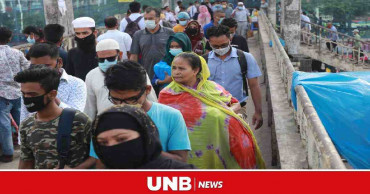Covid surge in Bangladesh
Covid surge in Bangladesh: Experts say lockdown likely to pay off
Experts think that the ongoing lockdown in Bangladesh appears to be paying off as both the active coronavirus cases and death toll have marked a sharp fall over the last few days in the country.
They, however, fear that the benefits might be short-lived ones as the government has allowed shopping malls to reopen and is thinking of resuming public transport services soon though the virus is yet to come under control.
The analysts warned that the Covid situation is likely to worsen again with the hordes of shoppers and holidaymakers ahead of Eid-ul-Fitr, one of the largest religious festivals of Muslims to be celebrated in the middle of this month.
They advised the government to announce a stimulus package for the transport workers instead of resuming transport service, enforce the law to make people to wear masks and maintain health safety rules and increase vigilance along the border to check any possible trespassing or illegal entry to Bangladesh from India to maintain the improved trend in the Covid situation.
The government imposed a complete countrywide lockdown on April 14 for a week to tackle the worsening Covid situation, and later it was extended up to May 5. But the government gave permission for reopening shops and malls across the country from April 25 amid lockdown.
Road, Transport and Bridges Minister Obaidul Quader said on Saturday the government is considering the resumption of public transport services in the country ahead of Eid.
Bangladesh’s health authorities reported 69 more deaths and 1,359 new cases in 24 hours until Sunday morning.
Also read: Covid-19: Bangladesh logs 69 more deaths, 1,359 new cases
The virus infection rate that increased to 23 percent early last month has now dropped to 9.60 percent on Sunday.
Lockdown proves to be effective
Dr Be-Nazir Ahmed, former director (disease control) of the DGHS, said the fall in the number of Covid cases and deaths has manifested that the ongoing lockdown has proved to be good.
“As the offices and mass transport service remains shut, people’s movement has declined, contributing to reducing the virus transmission,” he said
4 years ago
Covid surge in Bangladesh: Experts for tightening the grip with nighttime curfew
As Bangladesh is experiencing record-breaking Covid cases, experts think ‘health emergency’, ‘nighttime curfew’ and area-based lockdown can be the right measures to slow down the virus transmission.
They think the 18-point directive issued by the government on Monday is not enough as the coronavirus situation is going from bad to worse with both high infection and mortality rates in the country.
The experts warned that Bangladesh may experience an ‘explosive’ Covid situation in the coming months, breaking down the already overwhelmed medical system, if unnecessary public movements and mass gatherings cannot be controlled with the strict enforcement of laws.
They also suggested ramping up contact tracing, mass testing, expanding ICU capacity and ensuring necessary treatment facilities and equipment in every hospital, including upazila health complexes, since the Directorate General of Health Services (DGHS) has identified 31 districts as risky for the virus outbreak with a high infection rate.
Directives not matching with ground realities
Public health expert MH Chowdhury (Lenin), chairman of the medicine department at Health and Hope Hospital, the government’s directives are inconsistent with the coronavirus transmission pace.
“When it’s necessary to stop all the social and political gatherings right now, it was said to be discouraged in the directives. When a nighttime curfew should be enforced from 6pm, people are only asked not to come out of their homes unnecessarily. The shopping malls should be allowed to remain open for at best six hours on a limited scale, but the government said both sellers and buyers in shopping malls must follow the health rules,” he said.
MH Chowdhury said all types of mass gatherings should be controlled strictly, but the government asked to hold public exams maintaining health hygiene rules, which is not possible.
“People are discouraged to go to tourist and recreation spots, movie houses and theatres, and all kinds of fairs. But the Ekushey Book Fair is going on in full swing,” he pointed out.
Dr Lenin said the government has instructed all to maintain health safety rules in public transport, but people do not do that for lack of monitoring. “Strong enforcement of law is necessary to force people to abide by those rules.”
Dr Be-Nazir Ahmed, former director (disease control) of the DGHS, said, “The directives are not time-befitting and consistent with the current pandemic situation. “These instructions should have been given at least one month back when the virus cases started surging.”
Dr Be-Nazir said when elections can be held amid such a situation how the government can ask people not to arrange social programmes and mass gatherings.
Also read: Covid-19: Bangladesh’s caseload now 529,031, fatalities 7,942
4 years ago
New variant may be behind Covid surge in Bangladesh: Experts
Amid a sudden upsurge in coronavirus cases, health experts fear that a highly transmissible variant of the deadly virus might have appeared in Bangladesh through mutations.
They think a comprehensive study and genome squeezing is necessary to examine whether the mutations have led to the new variant contributing to the upsurge in Covid cases in Bangladesh.
Meanwhile, a team of Bangladeshi researchers in collaboration with Monash University in Malaysia found that coronavirus mutated 4,604 times in Bangladesh from April to December last year.
Examining 371 genome sequences of the virus, they found 34 unique mutations in Bangladesh.
The researchers laid emphasis on conducting more research on the unique mutations as they think any of them can be deadlier and the cause of the recent spike in the virus cases.
Also read: Virus variants, vaccine inequity responsible for rising Covid caseload: WHO
Causes behind the fresh wave of COVID-19 in Bangladesh
Talking to UNB, noted virologist Nazrul Islam, a member of the national technical advisory committee formed to tackle Covid-19, said it seems that a fresh wave of the coronavirus has begun in the country.
4 years ago





